Analysis of Leadership, Management, and Talent in the UK NHS
VerifiedAdded on 2023/01/12
|11
|2940
|38
Report
AI Summary
This report delves into the operational context of the National Health Service (NHS) in the UK, focusing on three key areas: leadership and management, training and development, and talent management. It examines how the NHS utilizes leadership styles, management theories, and operational strategies to effectively manage resources and personnel, particularly in the face of challenges like the COVID-19 pandemic. The report explores various leadership and management models, such as contingency and systems management theories, and provides recommendations for enhancing leadership practices. It further analyzes the NHS's training and development programs, detailing the models employed to improve employee skills and knowledge, including the use of the system model. The impact of training on employee performance and the overall quality of patient care is highlighted. Finally, the report addresses talent management within the NHS, emphasizing the recruitment, retention, and development of skilled employees to deliver high-quality healthcare services. The report concludes with recommendations for further improvements across all three areas, aiming to enhance the NHS's ability to provide effective and qualitative services to patients.

NHS
1
1
Paraphrase This Document
Need a fresh take? Get an instant paraphrase of this document with our AI Paraphraser
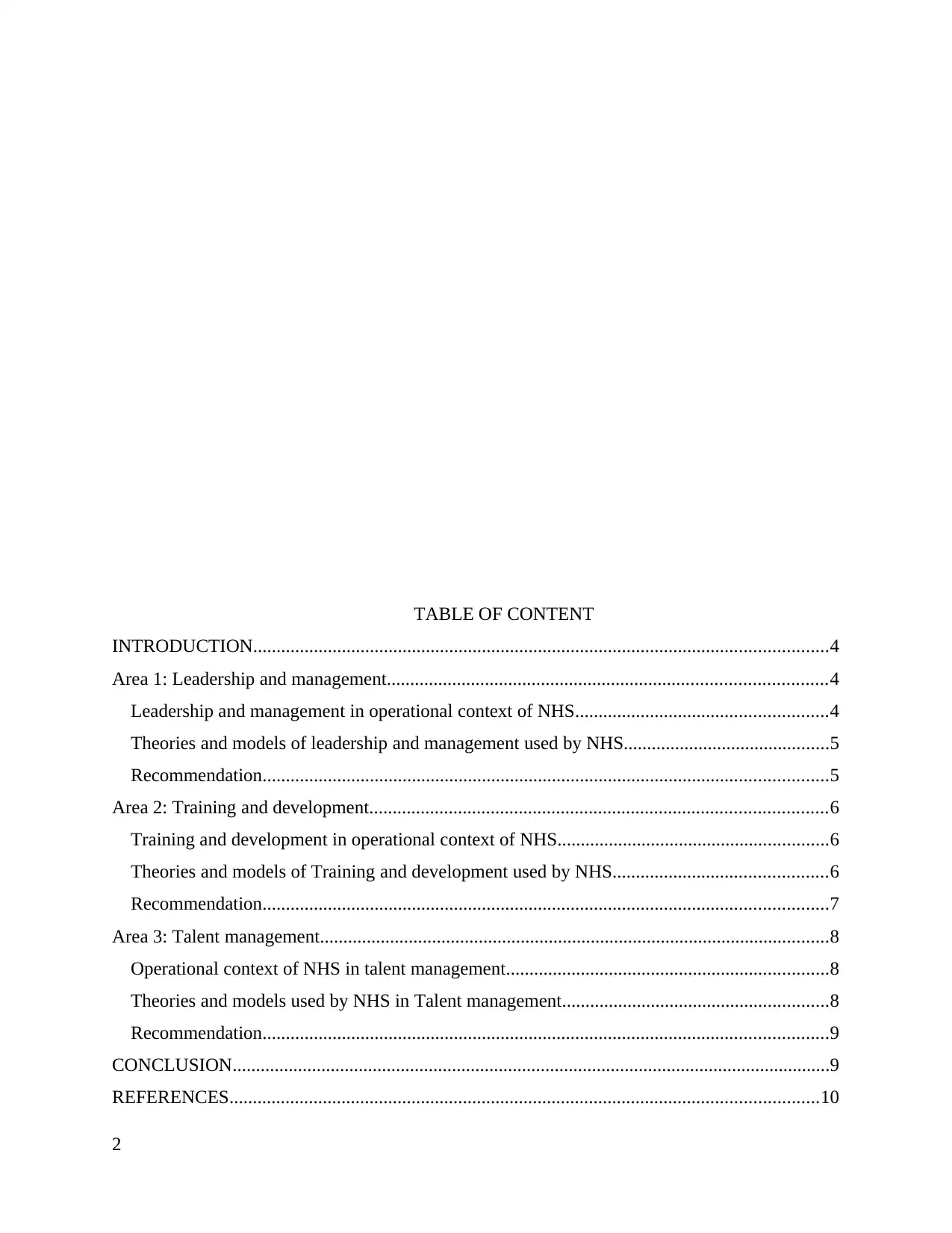
TABLE OF CONTENT
INTRODUCTION...........................................................................................................................4
Area 1: Leadership and management..............................................................................................4
Leadership and management in operational context of NHS......................................................4
Theories and models of leadership and management used by NHS............................................5
Recommendation.........................................................................................................................5
Area 2: Training and development..................................................................................................6
Training and development in operational context of NHS..........................................................6
Theories and models of Training and development used by NHS..............................................6
Recommendation.........................................................................................................................7
Area 3: Talent management.............................................................................................................8
Operational context of NHS in talent management.....................................................................8
Theories and models used by NHS in Talent management.........................................................8
Recommendation.........................................................................................................................9
CONCLUSION................................................................................................................................9
REFERENCES..............................................................................................................................10
2
INTRODUCTION...........................................................................................................................4
Area 1: Leadership and management..............................................................................................4
Leadership and management in operational context of NHS......................................................4
Theories and models of leadership and management used by NHS............................................5
Recommendation.........................................................................................................................5
Area 2: Training and development..................................................................................................6
Training and development in operational context of NHS..........................................................6
Theories and models of Training and development used by NHS..............................................6
Recommendation.........................................................................................................................7
Area 3: Talent management.............................................................................................................8
Operational context of NHS in talent management.....................................................................8
Theories and models used by NHS in Talent management.........................................................8
Recommendation.........................................................................................................................9
CONCLUSION................................................................................................................................9
REFERENCES..............................................................................................................................10
2

3
⊘ This is a preview!⊘
Do you want full access?
Subscribe today to unlock all pages.

Trusted by 1+ million students worldwide
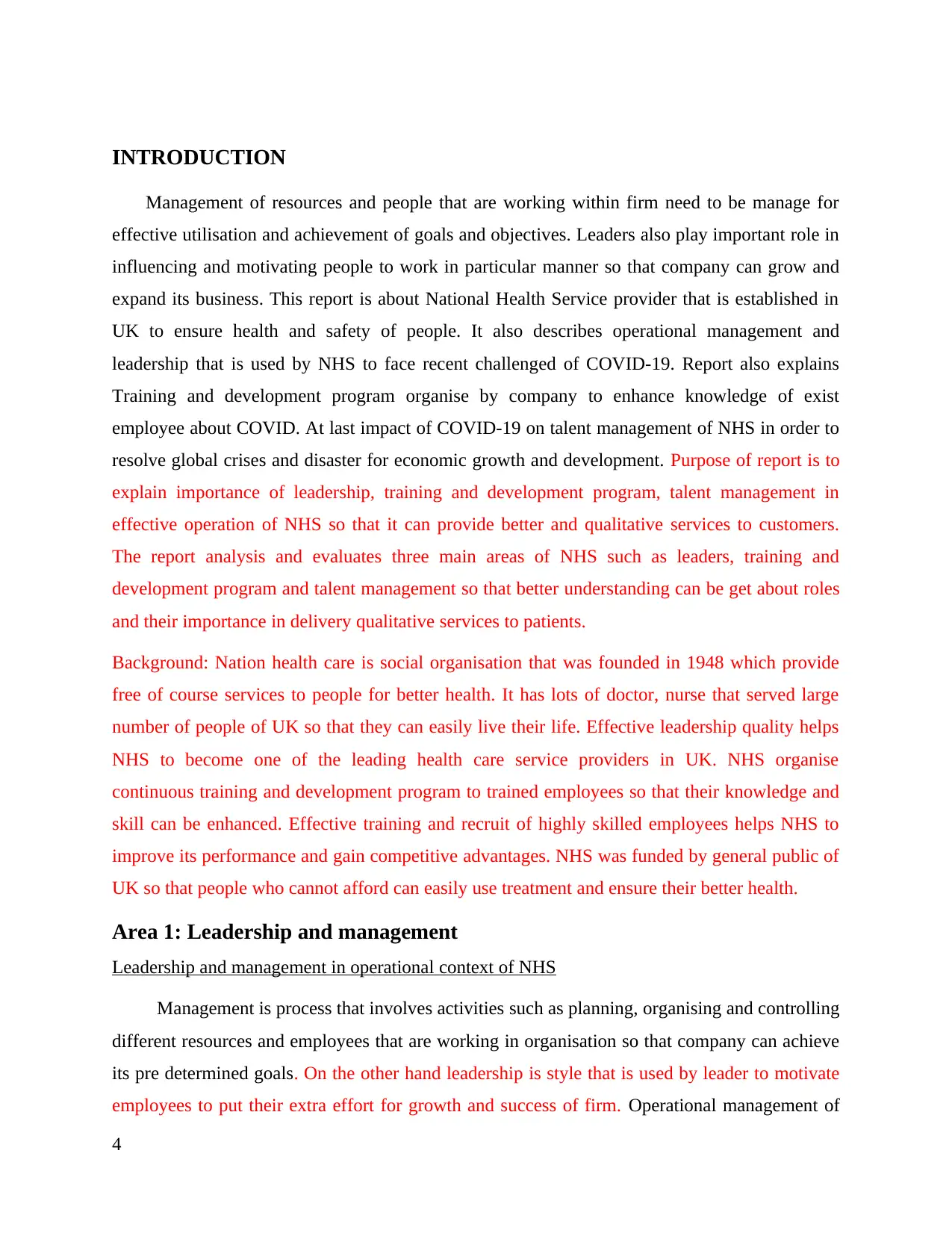
INTRODUCTION
Management of resources and people that are working within firm need to be manage for
effective utilisation and achievement of goals and objectives. Leaders also play important role in
influencing and motivating people to work in particular manner so that company can grow and
expand its business. This report is about National Health Service provider that is established in
UK to ensure health and safety of people. It also describes operational management and
leadership that is used by NHS to face recent challenged of COVID-19. Report also explains
Training and development program organise by company to enhance knowledge of exist
employee about COVID. At last impact of COVID-19 on talent management of NHS in order to
resolve global crises and disaster for economic growth and development. Purpose of report is to
explain importance of leadership, training and development program, talent management in
effective operation of NHS so that it can provide better and qualitative services to customers.
The report analysis and evaluates three main areas of NHS such as leaders, training and
development program and talent management so that better understanding can be get about roles
and their importance in delivery qualitative services to patients.
Background: Nation health care is social organisation that was founded in 1948 which provide
free of course services to people for better health. It has lots of doctor, nurse that served large
number of people of UK so that they can easily live their life. Effective leadership quality helps
NHS to become one of the leading health care service providers in UK. NHS organise
continuous training and development program to trained employees so that their knowledge and
skill can be enhanced. Effective training and recruit of highly skilled employees helps NHS to
improve its performance and gain competitive advantages. NHS was funded by general public of
UK so that people who cannot afford can easily use treatment and ensure their better health.
Area 1: Leadership and management
Leadership and management in operational context of NHS
Management is process that involves activities such as planning, organising and controlling
different resources and employees that are working in organisation so that company can achieve
its pre determined goals. On the other hand leadership is style that is used by leader to motivate
employees to put their extra effort for growth and success of firm. Operational management of
4
Management of resources and people that are working within firm need to be manage for
effective utilisation and achievement of goals and objectives. Leaders also play important role in
influencing and motivating people to work in particular manner so that company can grow and
expand its business. This report is about National Health Service provider that is established in
UK to ensure health and safety of people. It also describes operational management and
leadership that is used by NHS to face recent challenged of COVID-19. Report also explains
Training and development program organise by company to enhance knowledge of exist
employee about COVID. At last impact of COVID-19 on talent management of NHS in order to
resolve global crises and disaster for economic growth and development. Purpose of report is to
explain importance of leadership, training and development program, talent management in
effective operation of NHS so that it can provide better and qualitative services to customers.
The report analysis and evaluates three main areas of NHS such as leaders, training and
development program and talent management so that better understanding can be get about roles
and their importance in delivery qualitative services to patients.
Background: Nation health care is social organisation that was founded in 1948 which provide
free of course services to people for better health. It has lots of doctor, nurse that served large
number of people of UK so that they can easily live their life. Effective leadership quality helps
NHS to become one of the leading health care service providers in UK. NHS organise
continuous training and development program to trained employees so that their knowledge and
skill can be enhanced. Effective training and recruit of highly skilled employees helps NHS to
improve its performance and gain competitive advantages. NHS was funded by general public of
UK so that people who cannot afford can easily use treatment and ensure their better health.
Area 1: Leadership and management
Leadership and management in operational context of NHS
Management is process that involves activities such as planning, organising and controlling
different resources and employees that are working in organisation so that company can achieve
its pre determined goals. On the other hand leadership is style that is used by leader to motivate
employees to put their extra effort for growth and success of firm. Operational management of
4
Paraphrase This Document
Need a fresh take? Get an instant paraphrase of this document with our AI Paraphraser
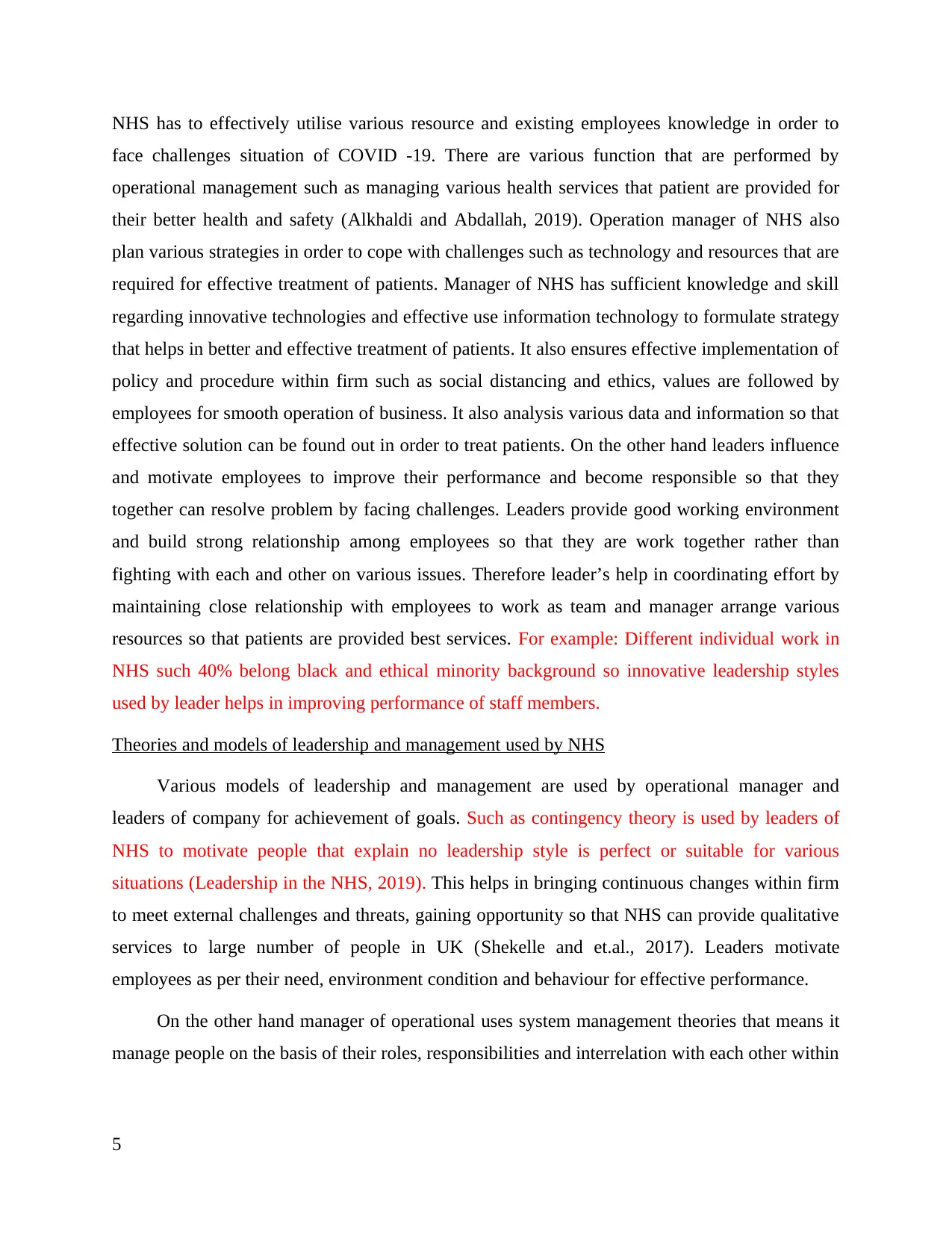
NHS has to effectively utilise various resource and existing employees knowledge in order to
face challenges situation of COVID -19. There are various function that are performed by
operational management such as managing various health services that patient are provided for
their better health and safety (Alkhaldi and Abdallah, 2019). Operation manager of NHS also
plan various strategies in order to cope with challenges such as technology and resources that are
required for effective treatment of patients. Manager of NHS has sufficient knowledge and skill
regarding innovative technologies and effective use information technology to formulate strategy
that helps in better and effective treatment of patients. It also ensures effective implementation of
policy and procedure within firm such as social distancing and ethics, values are followed by
employees for smooth operation of business. It also analysis various data and information so that
effective solution can be found out in order to treat patients. On the other hand leaders influence
and motivate employees to improve their performance and become responsible so that they
together can resolve problem by facing challenges. Leaders provide good working environment
and build strong relationship among employees so that they are work together rather than
fighting with each and other on various issues. Therefore leader’s help in coordinating effort by
maintaining close relationship with employees to work as team and manager arrange various
resources so that patients are provided best services. For example: Different individual work in
NHS such 40% belong black and ethical minority background so innovative leadership styles
used by leader helps in improving performance of staff members.
Theories and models of leadership and management used by NHS
Various models of leadership and management are used by operational manager and
leaders of company for achievement of goals. Such as contingency theory is used by leaders of
NHS to motivate people that explain no leadership style is perfect or suitable for various
situations (Leadership in the NHS, 2019). This helps in bringing continuous changes within firm
to meet external challenges and threats, gaining opportunity so that NHS can provide qualitative
services to large number of people in UK (Shekelle and et.al., 2017). Leaders motivate
employees as per their need, environment condition and behaviour for effective performance.
On the other hand manager of operational uses system management theories that means it
manage people on the basis of their roles, responsibilities and interrelation with each other within
5
face challenges situation of COVID -19. There are various function that are performed by
operational management such as managing various health services that patient are provided for
their better health and safety (Alkhaldi and Abdallah, 2019). Operation manager of NHS also
plan various strategies in order to cope with challenges such as technology and resources that are
required for effective treatment of patients. Manager of NHS has sufficient knowledge and skill
regarding innovative technologies and effective use information technology to formulate strategy
that helps in better and effective treatment of patients. It also ensures effective implementation of
policy and procedure within firm such as social distancing and ethics, values are followed by
employees for smooth operation of business. It also analysis various data and information so that
effective solution can be found out in order to treat patients. On the other hand leaders influence
and motivate employees to improve their performance and become responsible so that they
together can resolve problem by facing challenges. Leaders provide good working environment
and build strong relationship among employees so that they are work together rather than
fighting with each and other on various issues. Therefore leader’s help in coordinating effort by
maintaining close relationship with employees to work as team and manager arrange various
resources so that patients are provided best services. For example: Different individual work in
NHS such 40% belong black and ethical minority background so innovative leadership styles
used by leader helps in improving performance of staff members.
Theories and models of leadership and management used by NHS
Various models of leadership and management are used by operational manager and
leaders of company for achievement of goals. Such as contingency theory is used by leaders of
NHS to motivate people that explain no leadership style is perfect or suitable for various
situations (Leadership in the NHS, 2019). This helps in bringing continuous changes within firm
to meet external challenges and threats, gaining opportunity so that NHS can provide qualitative
services to large number of people in UK (Shekelle and et.al., 2017). Leaders motivate
employees as per their need, environment condition and behaviour for effective performance.
On the other hand manager of operational uses system management theories that means it
manage people on the basis of their roles, responsibilities and interrelation with each other within
5
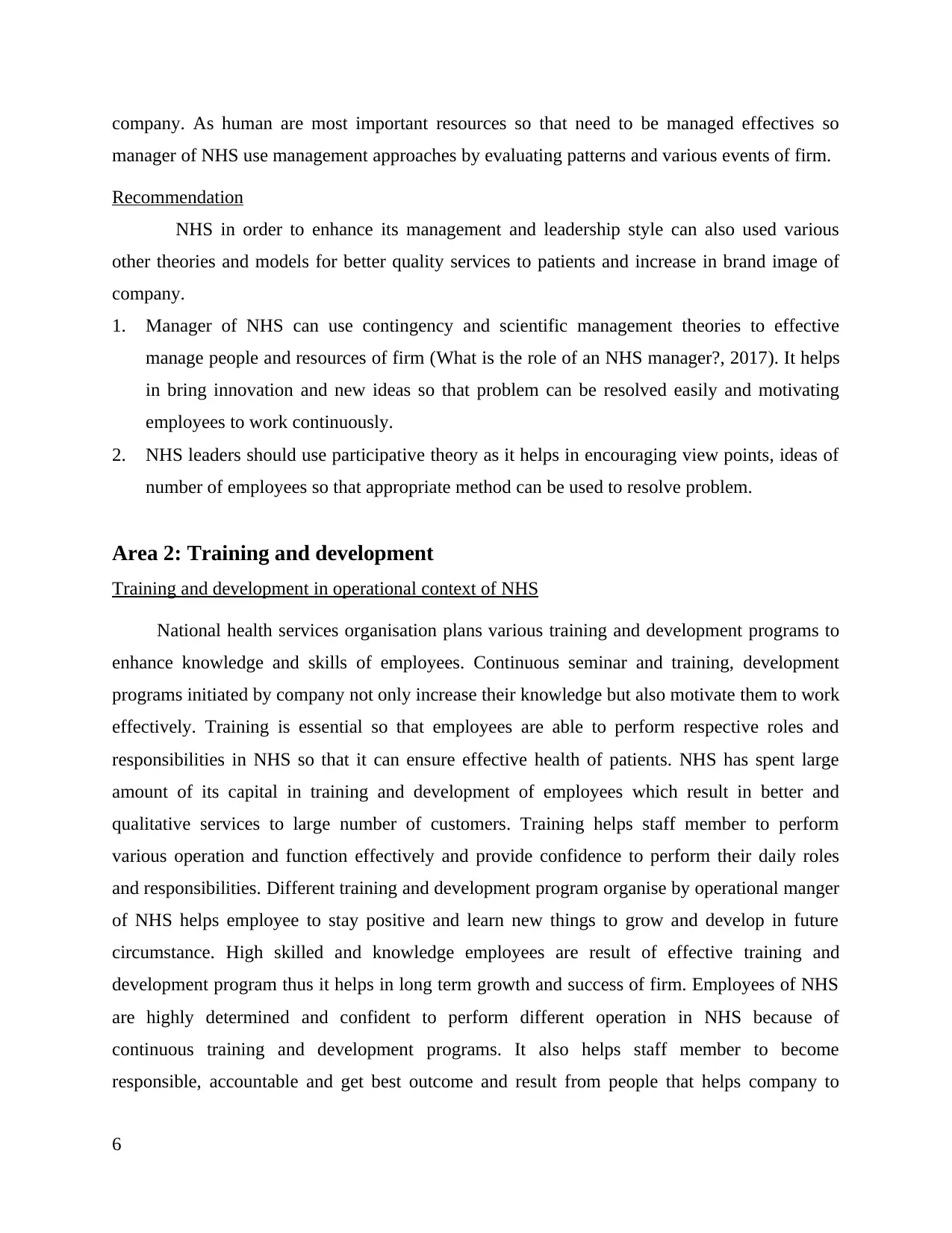
company. As human are most important resources so that need to be managed effectives so
manager of NHS use management approaches by evaluating patterns and various events of firm.
Recommendation
NHS in order to enhance its management and leadership style can also used various
other theories and models for better quality services to patients and increase in brand image of
company.
1. Manager of NHS can use contingency and scientific management theories to effective
manage people and resources of firm (What is the role of an NHS manager?, 2017). It helps
in bring innovation and new ideas so that problem can be resolved easily and motivating
employees to work continuously.
2. NHS leaders should use participative theory as it helps in encouraging view points, ideas of
number of employees so that appropriate method can be used to resolve problem.
Area 2: Training and development
Training and development in operational context of NHS
National health services organisation plans various training and development programs to
enhance knowledge and skills of employees. Continuous seminar and training, development
programs initiated by company not only increase their knowledge but also motivate them to work
effectively. Training is essential so that employees are able to perform respective roles and
responsibilities in NHS so that it can ensure effective health of patients. NHS has spent large
amount of its capital in training and development of employees which result in better and
qualitative services to large number of customers. Training helps staff member to perform
various operation and function effectively and provide confidence to perform their daily roles
and responsibilities. Different training and development program organise by operational manger
of NHS helps employee to stay positive and learn new things to grow and develop in future
circumstance. High skilled and knowledge employees are result of effective training and
development program thus it helps in long term growth and success of firm. Employees of NHS
are highly determined and confident to perform different operation in NHS because of
continuous training and development programs. It also helps staff member to become
responsible, accountable and get best outcome and result from people that helps company to
6
manager of NHS use management approaches by evaluating patterns and various events of firm.
Recommendation
NHS in order to enhance its management and leadership style can also used various
other theories and models for better quality services to patients and increase in brand image of
company.
1. Manager of NHS can use contingency and scientific management theories to effective
manage people and resources of firm (What is the role of an NHS manager?, 2017). It helps
in bring innovation and new ideas so that problem can be resolved easily and motivating
employees to work continuously.
2. NHS leaders should use participative theory as it helps in encouraging view points, ideas of
number of employees so that appropriate method can be used to resolve problem.
Area 2: Training and development
Training and development in operational context of NHS
National health services organisation plans various training and development programs to
enhance knowledge and skills of employees. Continuous seminar and training, development
programs initiated by company not only increase their knowledge but also motivate them to work
effectively. Training is essential so that employees are able to perform respective roles and
responsibilities in NHS so that it can ensure effective health of patients. NHS has spent large
amount of its capital in training and development of employees which result in better and
qualitative services to large number of customers. Training helps staff member to perform
various operation and function effectively and provide confidence to perform their daily roles
and responsibilities. Different training and development program organise by operational manger
of NHS helps employee to stay positive and learn new things to grow and develop in future
circumstance. High skilled and knowledge employees are result of effective training and
development program thus it helps in long term growth and success of firm. Employees of NHS
are highly determined and confident to perform different operation in NHS because of
continuous training and development programs. It also helps staff member to become
responsible, accountable and get best outcome and result from people that helps company to
6
⊘ This is a preview!⊘
Do you want full access?
Subscribe today to unlock all pages.

Trusted by 1+ million students worldwide
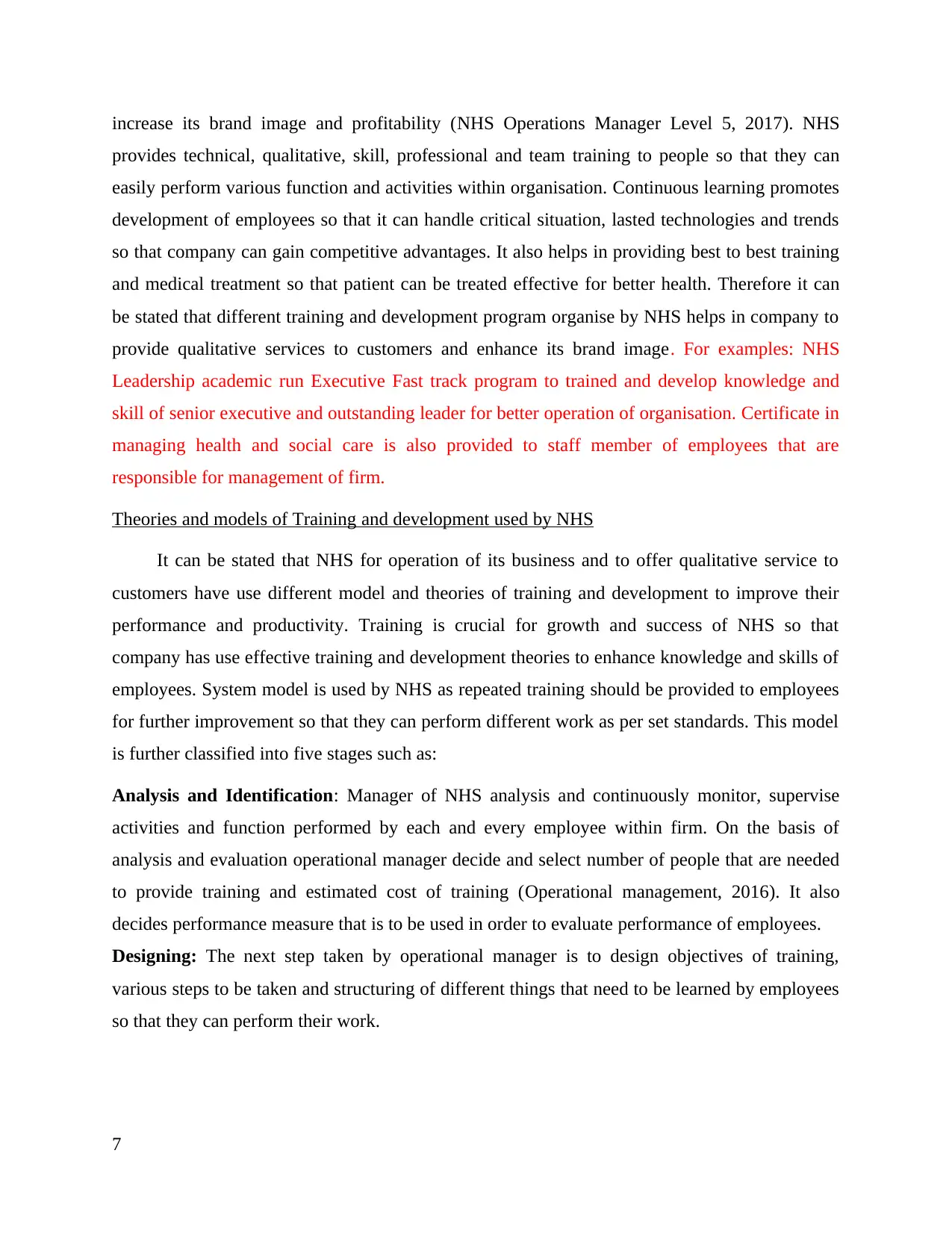
increase its brand image and profitability (NHS Operations Manager Level 5, 2017). NHS
provides technical, qualitative, skill, professional and team training to people so that they can
easily perform various function and activities within organisation. Continuous learning promotes
development of employees so that it can handle critical situation, lasted technologies and trends
so that company can gain competitive advantages. It also helps in providing best to best training
and medical treatment so that patient can be treated effective for better health. Therefore it can
be stated that different training and development program organise by NHS helps in company to
provide qualitative services to customers and enhance its brand image. For examples: NHS
Leadership academic run Executive Fast track program to trained and develop knowledge and
skill of senior executive and outstanding leader for better operation of organisation. Certificate in
managing health and social care is also provided to staff member of employees that are
responsible for management of firm.
Theories and models of Training and development used by NHS
It can be stated that NHS for operation of its business and to offer qualitative service to
customers have use different model and theories of training and development to improve their
performance and productivity. Training is crucial for growth and success of NHS so that
company has use effective training and development theories to enhance knowledge and skills of
employees. System model is used by NHS as repeated training should be provided to employees
for further improvement so that they can perform different work as per set standards. This model
is further classified into five stages such as:
Analysis and Identification: Manager of NHS analysis and continuously monitor, supervise
activities and function performed by each and every employee within firm. On the basis of
analysis and evaluation operational manager decide and select number of people that are needed
to provide training and estimated cost of training (Operational management, 2016). It also
decides performance measure that is to be used in order to evaluate performance of employees.
Designing: The next step taken by operational manager is to design objectives of training,
various steps to be taken and structuring of different things that need to be learned by employees
so that they can perform their work.
7
provides technical, qualitative, skill, professional and team training to people so that they can
easily perform various function and activities within organisation. Continuous learning promotes
development of employees so that it can handle critical situation, lasted technologies and trends
so that company can gain competitive advantages. It also helps in providing best to best training
and medical treatment so that patient can be treated effective for better health. Therefore it can
be stated that different training and development program organise by NHS helps in company to
provide qualitative services to customers and enhance its brand image. For examples: NHS
Leadership academic run Executive Fast track program to trained and develop knowledge and
skill of senior executive and outstanding leader for better operation of organisation. Certificate in
managing health and social care is also provided to staff member of employees that are
responsible for management of firm.
Theories and models of Training and development used by NHS
It can be stated that NHS for operation of its business and to offer qualitative service to
customers have use different model and theories of training and development to improve their
performance and productivity. Training is crucial for growth and success of NHS so that
company has use effective training and development theories to enhance knowledge and skills of
employees. System model is used by NHS as repeated training should be provided to employees
for further improvement so that they can perform different work as per set standards. This model
is further classified into five stages such as:
Analysis and Identification: Manager of NHS analysis and continuously monitor, supervise
activities and function performed by each and every employee within firm. On the basis of
analysis and evaluation operational manager decide and select number of people that are needed
to provide training and estimated cost of training (Operational management, 2016). It also
decides performance measure that is to be used in order to evaluate performance of employees.
Designing: The next step taken by operational manager is to design objectives of training,
various steps to be taken and structuring of different things that need to be learned by employees
so that they can perform their work.
7
Paraphrase This Document
Need a fresh take? Get an instant paraphrase of this document with our AI Paraphraser
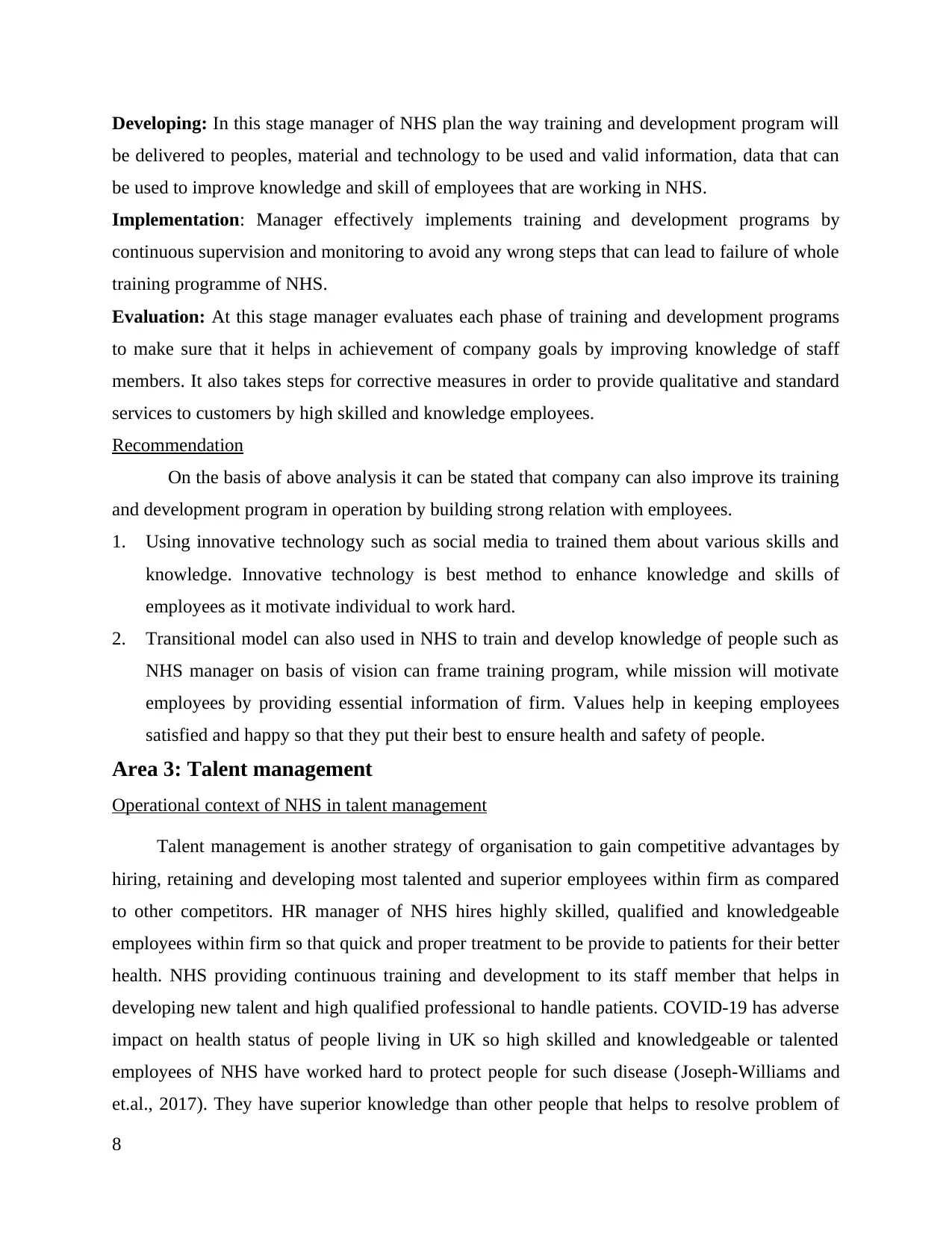
Developing: In this stage manager of NHS plan the way training and development program will
be delivered to peoples, material and technology to be used and valid information, data that can
be used to improve knowledge and skill of employees that are working in NHS.
Implementation: Manager effectively implements training and development programs by
continuous supervision and monitoring to avoid any wrong steps that can lead to failure of whole
training programme of NHS.
Evaluation: At this stage manager evaluates each phase of training and development programs
to make sure that it helps in achievement of company goals by improving knowledge of staff
members. It also takes steps for corrective measures in order to provide qualitative and standard
services to customers by high skilled and knowledge employees.
Recommendation
On the basis of above analysis it can be stated that company can also improve its training
and development program in operation by building strong relation with employees.
1. Using innovative technology such as social media to trained them about various skills and
knowledge. Innovative technology is best method to enhance knowledge and skills of
employees as it motivate individual to work hard.
2. Transitional model can also used in NHS to train and develop knowledge of people such as
NHS manager on basis of vision can frame training program, while mission will motivate
employees by providing essential information of firm. Values help in keeping employees
satisfied and happy so that they put their best to ensure health and safety of people.
Area 3: Talent management
Operational context of NHS in talent management
Talent management is another strategy of organisation to gain competitive advantages by
hiring, retaining and developing most talented and superior employees within firm as compared
to other competitors. HR manager of NHS hires highly skilled, qualified and knowledgeable
employees within firm so that quick and proper treatment to be provide to patients for their better
health. NHS providing continuous training and development to its staff member that helps in
developing new talent and high qualified professional to handle patients. COVID-19 has adverse
impact on health status of people living in UK so high skilled and knowledgeable or talented
employees of NHS have worked hard to protect people for such disease (Joseph-Williams and
et.al., 2017). They have superior knowledge than other people that helps to resolve problem of
8
be delivered to peoples, material and technology to be used and valid information, data that can
be used to improve knowledge and skill of employees that are working in NHS.
Implementation: Manager effectively implements training and development programs by
continuous supervision and monitoring to avoid any wrong steps that can lead to failure of whole
training programme of NHS.
Evaluation: At this stage manager evaluates each phase of training and development programs
to make sure that it helps in achievement of company goals by improving knowledge of staff
members. It also takes steps for corrective measures in order to provide qualitative and standard
services to customers by high skilled and knowledge employees.
Recommendation
On the basis of above analysis it can be stated that company can also improve its training
and development program in operation by building strong relation with employees.
1. Using innovative technology such as social media to trained them about various skills and
knowledge. Innovative technology is best method to enhance knowledge and skills of
employees as it motivate individual to work hard.
2. Transitional model can also used in NHS to train and develop knowledge of people such as
NHS manager on basis of vision can frame training program, while mission will motivate
employees by providing essential information of firm. Values help in keeping employees
satisfied and happy so that they put their best to ensure health and safety of people.
Area 3: Talent management
Operational context of NHS in talent management
Talent management is another strategy of organisation to gain competitive advantages by
hiring, retaining and developing most talented and superior employees within firm as compared
to other competitors. HR manager of NHS hires highly skilled, qualified and knowledgeable
employees within firm so that quick and proper treatment to be provide to patients for their better
health. NHS providing continuous training and development to its staff member that helps in
developing new talent and high qualified professional to handle patients. COVID-19 has adverse
impact on health status of people living in UK so high skilled and knowledgeable or talented
employees of NHS have worked hard to protect people for such disease (Joseph-Williams and
et.al., 2017). They have superior knowledge than other people that helps to resolve problem of
8
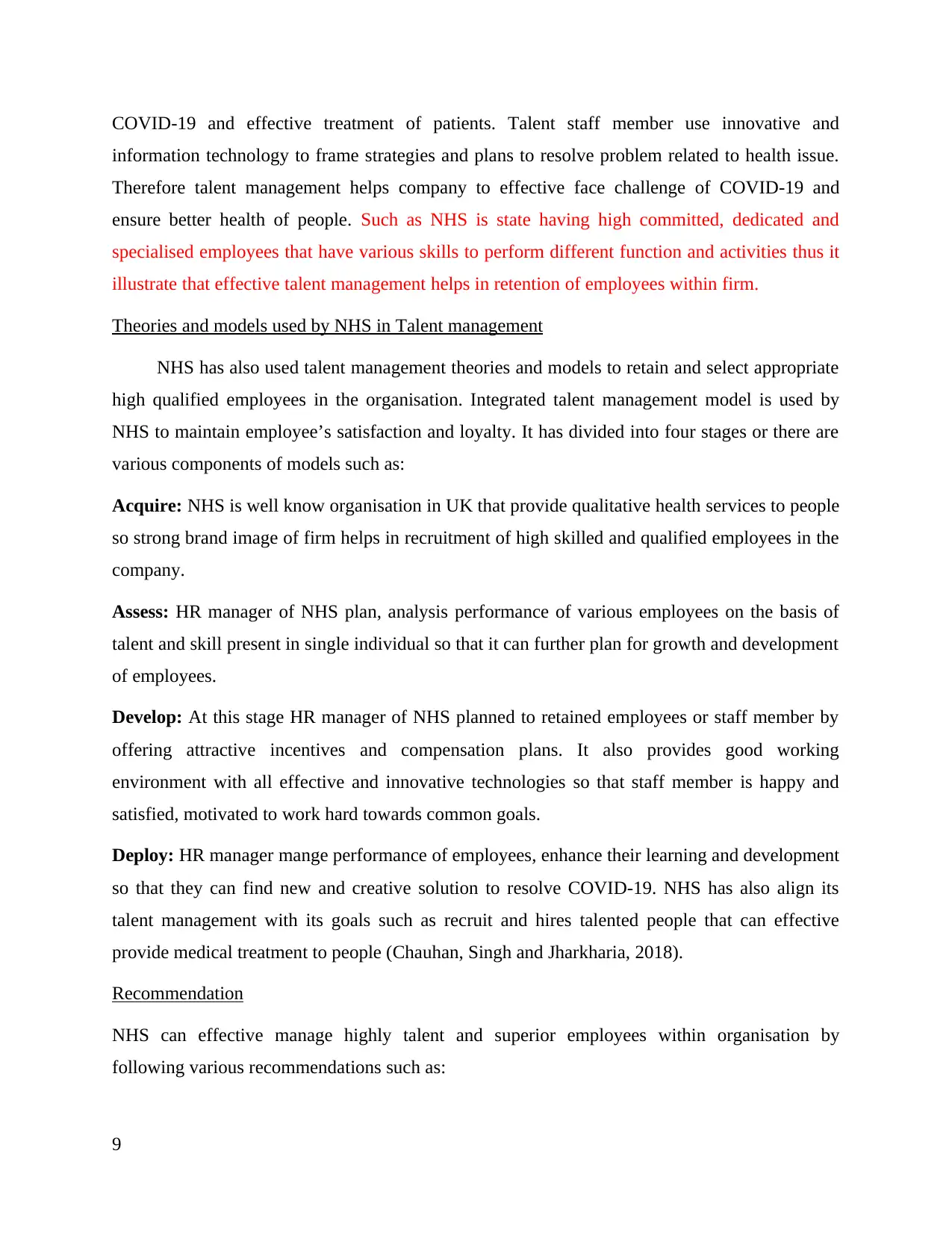
COVID-19 and effective treatment of patients. Talent staff member use innovative and
information technology to frame strategies and plans to resolve problem related to health issue.
Therefore talent management helps company to effective face challenge of COVID-19 and
ensure better health of people. Such as NHS is state having high committed, dedicated and
specialised employees that have various skills to perform different function and activities thus it
illustrate that effective talent management helps in retention of employees within firm.
Theories and models used by NHS in Talent management
NHS has also used talent management theories and models to retain and select appropriate
high qualified employees in the organisation. Integrated talent management model is used by
NHS to maintain employee’s satisfaction and loyalty. It has divided into four stages or there are
various components of models such as:
Acquire: NHS is well know organisation in UK that provide qualitative health services to people
so strong brand image of firm helps in recruitment of high skilled and qualified employees in the
company.
Assess: HR manager of NHS plan, analysis performance of various employees on the basis of
talent and skill present in single individual so that it can further plan for growth and development
of employees.
Develop: At this stage HR manager of NHS planned to retained employees or staff member by
offering attractive incentives and compensation plans. It also provides good working
environment with all effective and innovative technologies so that staff member is happy and
satisfied, motivated to work hard towards common goals.
Deploy: HR manager mange performance of employees, enhance their learning and development
so that they can find new and creative solution to resolve COVID-19. NHS has also align its
talent management with its goals such as recruit and hires talented people that can effective
provide medical treatment to people (Chauhan, Singh and Jharkharia, 2018).
Recommendation
NHS can effective manage highly talent and superior employees within organisation by
following various recommendations such as:
9
information technology to frame strategies and plans to resolve problem related to health issue.
Therefore talent management helps company to effective face challenge of COVID-19 and
ensure better health of people. Such as NHS is state having high committed, dedicated and
specialised employees that have various skills to perform different function and activities thus it
illustrate that effective talent management helps in retention of employees within firm.
Theories and models used by NHS in Talent management
NHS has also used talent management theories and models to retain and select appropriate
high qualified employees in the organisation. Integrated talent management model is used by
NHS to maintain employee’s satisfaction and loyalty. It has divided into four stages or there are
various components of models such as:
Acquire: NHS is well know organisation in UK that provide qualitative health services to people
so strong brand image of firm helps in recruitment of high skilled and qualified employees in the
company.
Assess: HR manager of NHS plan, analysis performance of various employees on the basis of
talent and skill present in single individual so that it can further plan for growth and development
of employees.
Develop: At this stage HR manager of NHS planned to retained employees or staff member by
offering attractive incentives and compensation plans. It also provides good working
environment with all effective and innovative technologies so that staff member is happy and
satisfied, motivated to work hard towards common goals.
Deploy: HR manager mange performance of employees, enhance their learning and development
so that they can find new and creative solution to resolve COVID-19. NHS has also align its
talent management with its goals such as recruit and hires talented people that can effective
provide medical treatment to people (Chauhan, Singh and Jharkharia, 2018).
Recommendation
NHS can effective manage highly talent and superior employees within organisation by
following various recommendations such as:
9
⊘ This is a preview!⊘
Do you want full access?
Subscribe today to unlock all pages.

Trusted by 1+ million students worldwide
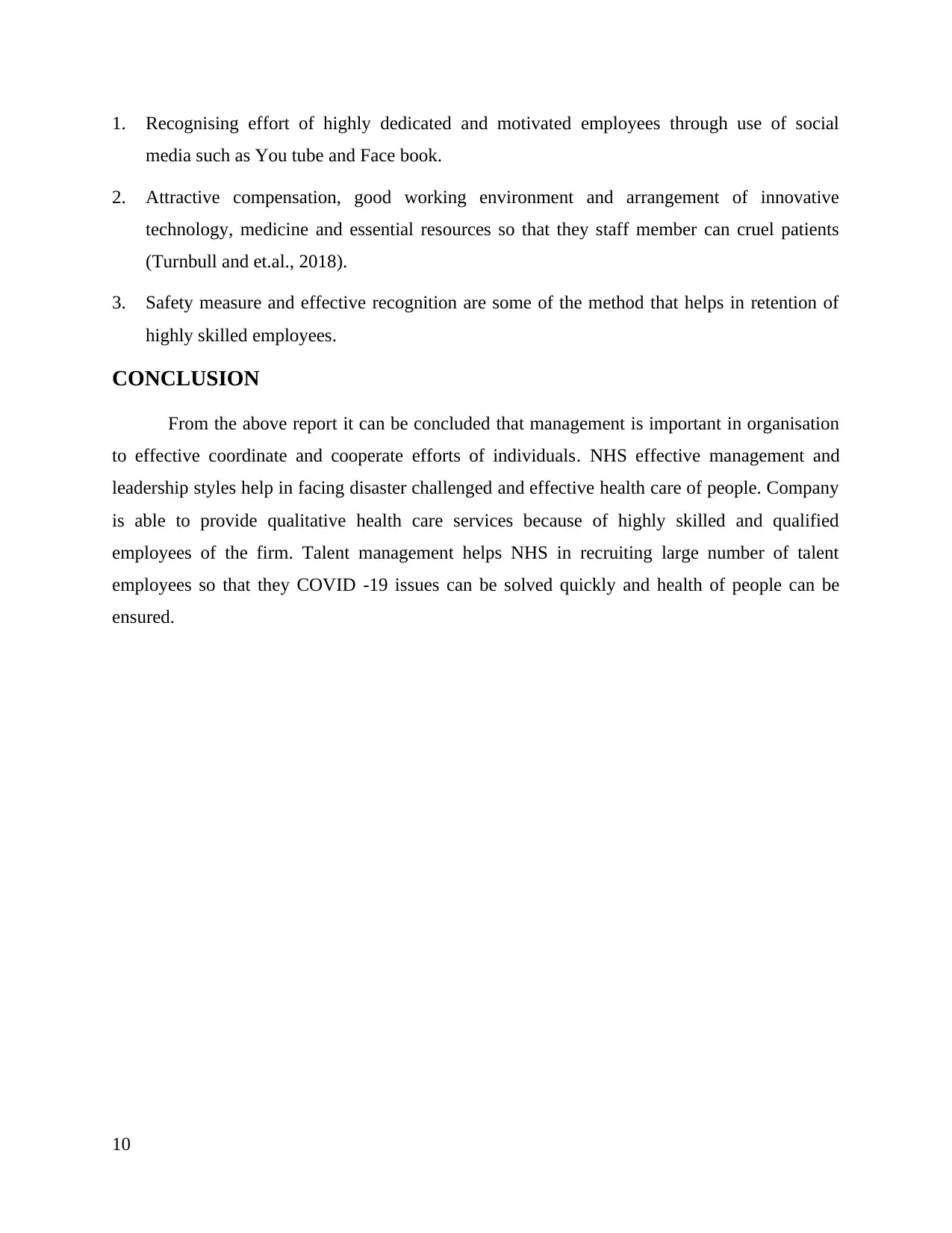
1. Recognising effort of highly dedicated and motivated employees through use of social
media such as You tube and Face book.
2. Attractive compensation, good working environment and arrangement of innovative
technology, medicine and essential resources so that they staff member can cruel patients
(Turnbull and et.al., 2018).
3. Safety measure and effective recognition are some of the method that helps in retention of
highly skilled employees.
CONCLUSION
From the above report it can be concluded that management is important in organisation
to effective coordinate and cooperate efforts of individuals. NHS effective management and
leadership styles help in facing disaster challenged and effective health care of people. Company
is able to provide qualitative health care services because of highly skilled and qualified
employees of the firm. Talent management helps NHS in recruiting large number of talent
employees so that they COVID -19 issues can be solved quickly and health of people can be
ensured.
10
media such as You tube and Face book.
2. Attractive compensation, good working environment and arrangement of innovative
technology, medicine and essential resources so that they staff member can cruel patients
(Turnbull and et.al., 2018).
3. Safety measure and effective recognition are some of the method that helps in retention of
highly skilled employees.
CONCLUSION
From the above report it can be concluded that management is important in organisation
to effective coordinate and cooperate efforts of individuals. NHS effective management and
leadership styles help in facing disaster challenged and effective health care of people. Company
is able to provide qualitative health care services because of highly skilled and qualified
employees of the firm. Talent management helps NHS in recruiting large number of talent
employees so that they COVID -19 issues can be solved quickly and health of people can be
ensured.
10
Paraphrase This Document
Need a fresh take? Get an instant paraphrase of this document with our AI Paraphraser
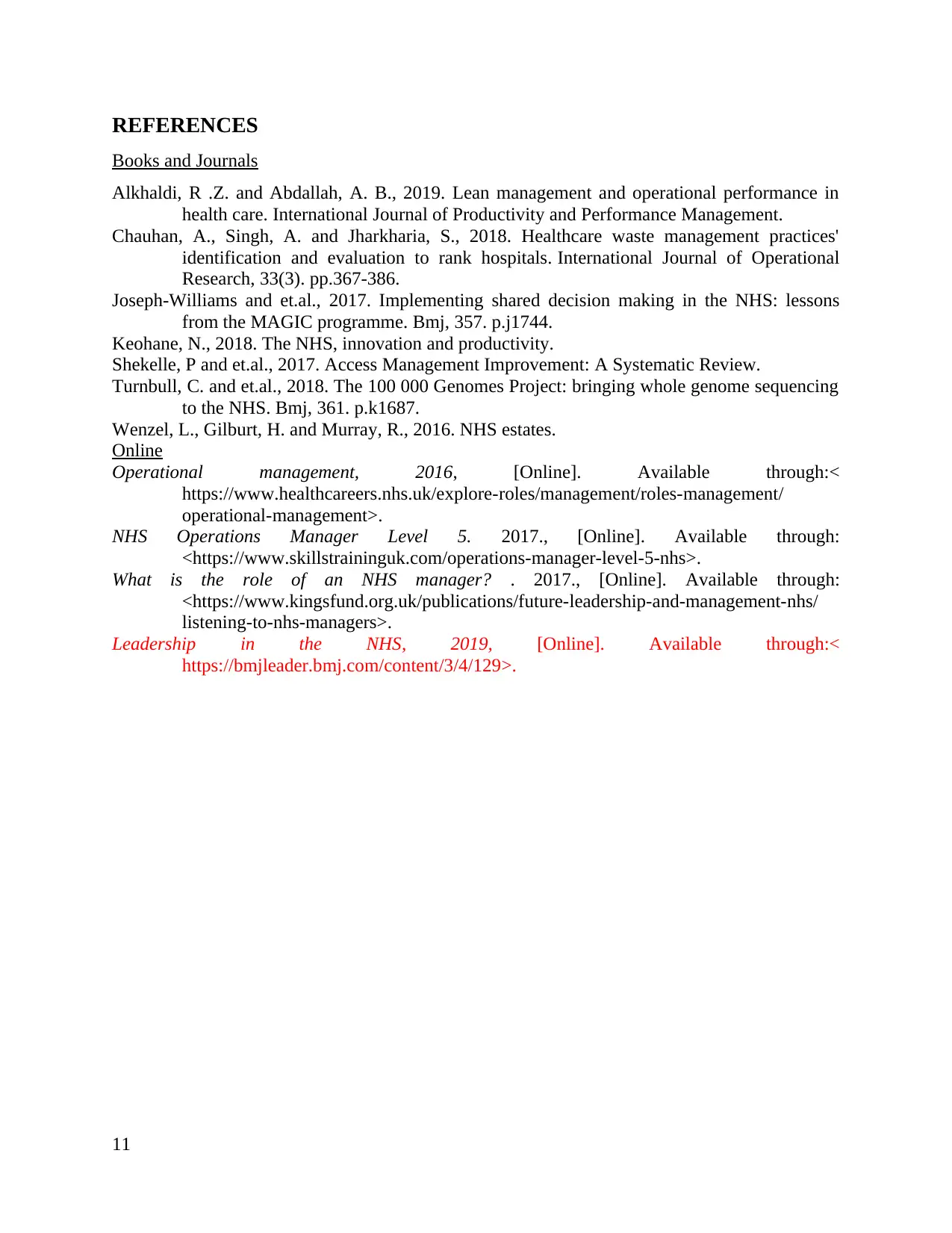
REFERENCES
Books and Journals
Alkhaldi, R .Z. and Abdallah, A. B., 2019. Lean management and operational performance in
health care. International Journal of Productivity and Performance Management.
Chauhan, A., Singh, A. and Jharkharia, S., 2018. Healthcare waste management practices'
identification and evaluation to rank hospitals. International Journal of Operational
Research, 33(3). pp.367-386.
Joseph-Williams and et.al., 2017. Implementing shared decision making in the NHS: lessons
from the MAGIC programme. Bmj, 357. p.j1744.
Keohane, N., 2018. The NHS, innovation and productivity.
Shekelle, P and et.al., 2017. Access Management Improvement: A Systematic Review.
Turnbull, C. and et.al., 2018. The 100 000 Genomes Project: bringing whole genome sequencing
to the NHS. Bmj, 361. p.k1687.
Wenzel, L., Gilburt, H. and Murray, R., 2016. NHS estates.
Online
Operational management, 2016, [Online]. Available through:<
https://www.healthcareers.nhs.uk/explore-roles/management/roles-management/
operational-management>.
NHS Operations Manager Level 5. 2017., [Online]. Available through:
<https://www.skillstraininguk.com/operations-manager-level-5-nhs>.
What is the role of an NHS manager? . 2017., [Online]. Available through:
<https://www.kingsfund.org.uk/publications/future-leadership-and-management-nhs/
listening-to-nhs-managers>.
Leadership in the NHS, 2019, [Online]. Available through:<
https://bmjleader.bmj.com/content/3/4/129>.
11
Books and Journals
Alkhaldi, R .Z. and Abdallah, A. B., 2019. Lean management and operational performance in
health care. International Journal of Productivity and Performance Management.
Chauhan, A., Singh, A. and Jharkharia, S., 2018. Healthcare waste management practices'
identification and evaluation to rank hospitals. International Journal of Operational
Research, 33(3). pp.367-386.
Joseph-Williams and et.al., 2017. Implementing shared decision making in the NHS: lessons
from the MAGIC programme. Bmj, 357. p.j1744.
Keohane, N., 2018. The NHS, innovation and productivity.
Shekelle, P and et.al., 2017. Access Management Improvement: A Systematic Review.
Turnbull, C. and et.al., 2018. The 100 000 Genomes Project: bringing whole genome sequencing
to the NHS. Bmj, 361. p.k1687.
Wenzel, L., Gilburt, H. and Murray, R., 2016. NHS estates.
Online
Operational management, 2016, [Online]. Available through:<
https://www.healthcareers.nhs.uk/explore-roles/management/roles-management/
operational-management>.
NHS Operations Manager Level 5. 2017., [Online]. Available through:
<https://www.skillstraininguk.com/operations-manager-level-5-nhs>.
What is the role of an NHS manager? . 2017., [Online]. Available through:
<https://www.kingsfund.org.uk/publications/future-leadership-and-management-nhs/
listening-to-nhs-managers>.
Leadership in the NHS, 2019, [Online]. Available through:<
https://bmjleader.bmj.com/content/3/4/129>.
11
1 out of 11
Related Documents
Your All-in-One AI-Powered Toolkit for Academic Success.
+13062052269
info@desklib.com
Available 24*7 on WhatsApp / Email
![[object Object]](/_next/static/media/star-bottom.7253800d.svg)
Unlock your academic potential
Copyright © 2020–2026 A2Z Services. All Rights Reserved. Developed and managed by ZUCOL.




